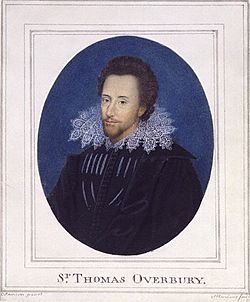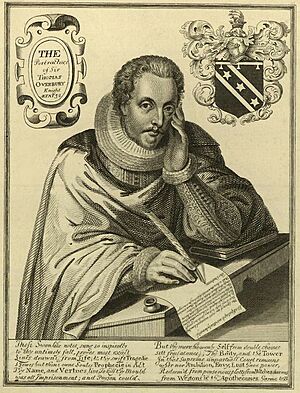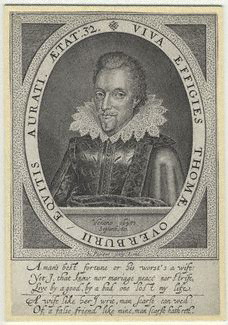Thomas Overbury facts for kids
Quick facts for kids
Thomas Overbury
|
|
|---|---|
 |
|
| Born |
Thomas Overbury
1581 Compton Scorpion, Warwickshire, England
|
| Died | 14 September 1613 |
| Cause of death | Poison |
| Resting place | Tower of London |
| Nationality | English |
| Education | Middle Temple |
| Alma mater | Queen's College, Oxford |
| Occupation | Poet, courtier |
| Employer | Robert Carr |
| Title | Sir |
| Opponent(s) |
|
| Parent(s) | Nicholas Overbury, Mary Palmer |
| Relatives | Brother: Sir Giles Overbury |
Sir Thomas Overbury (born 1581 – died 1613) was an English poet and writer. He is famous for his sad death, which became a big scandal. His poem, A Wife, described what a good wife should be like. This poem played a part in the events leading to his death.
Contents
Early Life and Education
Thomas Overbury was born in Warwickshire, England. His parents were Nicholas Overbury and Mary Palmer.
In 1595, he went to Queen's College, Oxford University. He earned his degree in 1598. He also began studying law in London.
He became friends with important people like Sir Robert Cecil. He traveled around Europe. People knew him as a smart and confident person.
Friendship with Robert Carr
Around 1601, Thomas Overbury met Robert Carr in Scotland. Carr was a young assistant to a powerful lord. They became very good friends and moved to London together.
Overbury was already working for King James I. In 1606, Carr caught the King's attention. He broke his leg during a jousting event.
The King liked Carr and made him a favorite at court. Overbury helped Carr become even more powerful. He gave Carr good advice.
In 1608, King James knighted Overbury. He also traveled in the Netherlands and France. He spent time in Antwerp and Paris.
When Carr became Viscount Rochester in 1610, their friendship continued. Overbury's wisdom and Carr's closeness to the King helped Carr rise quickly. Soon, Carr was one of the most powerful men in England.
Court Problems and Death
After a powerful leader named Robert Cecil died in 1612, a group called the Howard party wanted more control. This group included several important lords.
Robert Carr, who was very powerful, became involved with this group. He also started a relationship with Frances Howard. She was already married.
Overbury strongly disagreed with Carr's relationship. He told Carr that Frances Howard was not a good person. He also warned Carr that this relationship would hurt his career.
But Carr was in love and told Frances what Overbury said. Around this time, Overbury wrote his poem A Wife. It described the good qualities a man should look for in a wife.
Frances Howard thought Overbury wrote the poem to make Carr see her flaws. This started a serious conflict between Frances and Overbury.
Frances tried to make Overbury seem disrespectful to the Queen, Anne of Denmark. The Queen became upset with Overbury. He was not allowed to be near her at court.
King James I offered Overbury a job as an ambassador to Russia. This was partly because the King was jealous of Overbury's close friendship with Carr. Also, the Howard party wanted Overbury out of the way.
Overbury refused the job. He might have felt tricked by Carr. Or he might have felt it was important to stay in England.
King James was very angry that Overbury refused. On April 22, 1613, the King sent Overbury to the Tower of London. Overbury died there on September 14, 1613.
The Trial and Aftermath
In 1615 and 1616, trials were held for six people involved in Overbury's death. Evidence showed there was a plan against him.
It seems Overbury was put in the Tower to keep him quiet. He knew too much about Carr's dealings with Frances. He also strongly opposed the Howard family.
Frances Howard admitted her part in Overbury's death. Her husband, Robert Carr, did not. King James tried to get Carr to confess, promising him a pardon.
In May 1616, Frances Howard and Robert Carr were found guilty. They were sentenced to death. However, they stayed in the Tower until 1622 and were later pardoned.
Four other people involved in the plot were found guilty in 1615. They were Richard Weston, Anne Turner, Gervase Helwys, and Simon Franklin. They did not have powerful friends and were hanged.
This scandal made King James's court look very bad. It created an image of corruption and dishonesty.
See also
- The Cobbe portrait, which some scholars believe is a portrait of Overbury, not William Shakespeare.
 | Selma Burke |
 | Pauline Powell Burns |
 | Frederick J. Brown |
 | Robert Blackburn |



